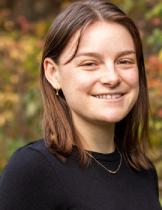
J-PAL’s Diana Warira gives keynote address at the Africa Evidence Network’s EVIDENCE 2022 Conference

Diana Warira, a policy manager at J-PAL Global, recently presented a keynote address at the Africa Evidence Network’s EVIDENCE 2022 Conference, at a session laying the spotlight on Africa Evidence Leadership Award (AELA) winners. The award is conferred to individuals who have demonstrated leadership within evidence-informed decision-making on the African continent.
As the 2021 winner of the AELA, Diana remarked on several issues—among them was the importance of meaningful collaboration between academics, policymakers, and others to strengthen evidence-informed decision-making (EIDM) in Africa. Diana also emphasized the need to do this work sustainably to ensure EIDM remains a central part of decision-making by governments in the next ten years.
At J-PAL, Diana manages J-PAL’s Gender and Economic Agency Initiative (GEA) in East Africa. In this position, Diana works with governments and non-state actors in Ethiopia, Kenya, Tanzania, and Uganda to build strategic relationships and synthesize and facilitate the use of evidence to inform public policies on women’s work in the region.
For more, watch Diana’s remarks or read a transcript of her speech below:
Diana Warira’s keynote address: The Africa we want is within reach
Reflecting on evidence-informed decision-making in Africa and the AEN in the last ten years
It is a real honor to be speaking at this year’s EVIDENCE conference. A convening that all of us in the evidence-informed decision-making (EIDM) space have come to love. A place where our shared experiences, eye-opening lessons and grueling challenges, always result in more shared understanding and resolve, to continue working for a better Africa where evidence is the centerpiece of our development.
EIDM in Africa has grown in leaps and bounds over the last decade. We have various players in this space; ranging from evidence producers, evidence mediators, like myself, and evidence users. And the ecosystem continues to be defined in more ways than these.
Seeing how these different players have slowly begun to emerge from their silos is very refreshing. And this transformation sets the stage for sustainability in EIDM practice.
For a long time, researchers and policymakers in particular, were two very distinct communities who largely remained on separate sides of the evidence divide. But today, we have many examples of these two groups working closely to design, implement, and evaluate evidence-informed programs and policies. Personally, I have sat in forums where researchers and policymakers as well as program implementers have worked together on evidence-driven initiatives, including policy processes.
With this shift, things can only get better to strengthen EIDM in Africa. As for the evidence mediators, our role in the EIDM ecosystem has become clearer and I’m proud to be among the front-runners occupying this space, making our voices heard, and putting our skills to use to ensure policy-relevant evidence gets into the hands of decision-makers in a timely manner.
I’m extremely grateful for opportunities like my current role at J-PAL, because not only do I play a key role in influencing decision-makers with evidence, but I’m also part of the idea-generation process for defining policy-relevant studies. Evidence mediators are no longer peripheral observers of the evidence-to-policy interactions.
Another key shift worth our attention is the increased evidence demand by governments to inform decision-making processes. For the most part, in the contexts where I have worked, I believe we are progressing from the foundational stage of making the case for evidence use.
Largely, there is consensus that EIDM will help countries achieve their development goals. Most African governments are now keen on how to ensure they can effectively apply evidence, and implement evidence-driven policies. There is also growing interest to partner with organizations like J-PAL and other like-minded institutions, to measure the impact of these policies.
With the caution of not making sweeping statements, this shift is by no means the case across board, bearing in mind the heterogeneity of each country and policy context. Even within countries, there’s more promise of EIDM in some government ministries, departments, and agencies than in others.
While I may not cover all aspects of how the evidence ecosystem in Africa has shifted in my reflection, the interest by governments and other evidence users to grow their capacities and skills in evidence use is astounding and worth mentioning. It is encouraging to see several initiatives led by AEN and its membership to strengthen evidence capacities for these groups.
Growing capacities for EIDM can take different forms, including trainings. However, I’ll speak to one form that I have seen play out very well in the Kenyan policy context. The government technical working group (TWG) approach.
TWGs are not a new mechanism for engaging with governments in many countries. However, I have found this to be a very promising pathway to strengthening the capacities of government state departments to formulate strong policies grounded in evidence. Not only do the decision-makers get access to a wide pool of evidence from stakeholders when deliberating policies, but this is also a great place to thrash out the ideas around policy positions from diverse mindsets, in a context that is largely evidence-driven.
Here, I will give a big shout-out to the State Department for Gender and Affirmative Action in Kenya’s Ministry of Public Service, Gender and Affirmative Action. The State Department has opened its doors to non-state actors to support in the development of various gender policies from a position of evidence. This political will and commitment from government demonstrates that several other factors besides the availability of policy-relevant evidence are key success factors for EIDM. Leveraging existing government mechanisms for stronger evidence use is a winning strategy. And most importantly, don’t forget to nurture those relationships.
Looking forward at the next ten years in relation to EIDM in Africa and my work
In the next decade, I’m looking forward to three things on EIDM in Africa:
One, is contributing to sustainable approaches to better EIDM practices within governments. As we know, it is the government’s mandate to formulate and implement policy. Therefore, as non-state actors, it is prudent that we invest in initiatives that will entrench a culture of evidence use within governments, and keep these institutions going strong, long after donor funding and external support has wound down.
As policy and government relations professionals, we know we are there for the long haul in support of EIDM initiatives. However, realistically, we shall not always have the resources to actively support the work being undertaken by governments. There are also the challenges posed by staffing transitions within governments due to election cycles and other changes in the public service.
Sustainability can take many forms, including ensuring the presence of institutional policies and frameworks whose mandate is to ensure all government decision-making is evidence-driven. I look forward to supporting processes that allow governments to establish institutional mechanisms that ensure EIDM practice outlives individuals and regimes.
Strengthening the skills of technical staff within governments to access, assess, synthesize, and utilize evidence to inform decision-making is also a critical piece for sustainability. Several organizations are doing a lot on this front through different pathways including my friends at African Institute for Development Policy, my colleagues at J-PAL and Innovations for Poverty Action, and many more within and outside the AEN network across Africa.
Seeing governments include these investments in their budgets is something I look forward to championing over the next decade. While external funding has brought current efforts a long way, more is needed. However, these efforts cannot be sustainable in the long-term if governments don’t allocate budgets to EIDM capacity strengthening for their technical teams.
Two, is a different angle to the sustainability question. I am looking forward to more long-term funding allocated to EIDM initiatives. I am glad to be living at a time when funding agencies are at the forefront to ensure EIDM work is getting financial resources. However, in the contexts I have worked, funding for EIDM work seems to range from one to three years, which is not an adequate timeline to ensure meaningful work is carried out for the long haul. Three to five year funding cycles, at a minimum, could help us do more.
Speaking from experience, it could take a minimum of a year to establish new policy relationships before real work can get off the ground, considering government bureaucracies, navigating politics, and many more unforeseen pitfalls in government relations. As I said earlier, EIDM practice cannot be a “touch and go” scenario. A couple of meetings with government officials and their technical teams is not enough to inculcate and support a culture of EIDM.
In a nutshell, I am making a personal appeal to funding agencies to reconsider the funding timelines for EIDM-related initiatives in Africa and beyond, if at all we want to see impact that outlives funding cycles, government regimes, and staffing transitions even among non-state actors working with governments.
Three, as a communications professional by training, I am inspired by the immense potential of those in my field to play an even greater role in mediating the EIDM transformation of Africa. We still have a long way to go to have a culture of EIDM on the continent. As evidence mediators, we have a unique perspective that’s different from that of the producers and users of evidence. We have an eye and ear in both corners and by understanding the needs of these two groups, we can be more effective in mediating EIDM.
I have a long way to go myself but, through self-reflection, I have learned that some ingredients can enhance this mediation role.
Firstly, it’s taking the time to immerse yourself in the evidence-to-policy discourse and putting yourself in those spaces. A theoretical understanding is great, but a good sense of how the real world works is even better.
Secondly, build your technical skills. I am grateful for the challenge at J-PAL to grow my technical skills in understanding and communicating evidence from impact evaluations, and the technical training the institution has provided. Innate brilliance will only take you so far, build those technical skills.
Thirdly, build your network among evidence producers and evidence users. As they say, your network is your net worth. I have learned to nurture the relationships I have built over my decade-long career. One pro-tip, ensure these relationships are deep and meaningful. You will not always have something tangible to partner on at every given moment, but trust me, when the time is right, there will be opportunities for mutual benefit. This is your way of ensuring these relationships are not extractive.
Finally, ensure you’re in it for the long haul. Sometimes relationships you have built through blood and sweat may fall apart and there’s nothing to show for your hard work. But stay the course because you know what your goal is. Dust yourself off and keep going.
What winning the AELA means to me and what it has done for me personally and professionally
Winning the AELA is the highlight of my career. What a pleasure that this happened in my mid-thirties. This award has validated my many years of working on development issues as an early-career professional and finally entering the EIDM space, knowing that I was working for a better Africa. This award is a springboard to continue reaching for my dreams, to sit at the highest level of decision-making to ensure this continent’s potential is not just fancy prose in development literature, but a reality for the millions living on this continent. EIDM can get us there, and I want to continue being an active participant in this process. EIDM can deliver us the African dream of eliminating disease, unemployment and runaway poverty, corruption, and the many more obstacles to our equitable development.
As I told my Young African Leaders Initiative colleagues three years ago, one day I will chair the African Union Commission. And this award tells me I can do it. This award is a symbol of the fulfilment of the promise that if you work at something long enough, you will reap the fruits.
My family, my current and previous colleagues were so proud of me when I shared the news of this win a year ago. Thank you all for celebrating me both in person and in spirit. The person I am today is the sum of all the experiences I have had. Today I stand on the shoulders of all those who believed in me, even when sometimes I gave up on myself.


